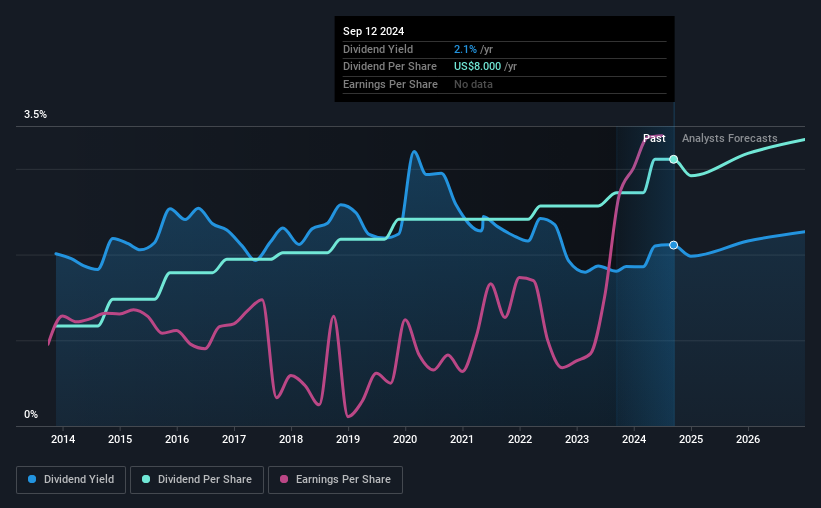- United States
- /
- Insurance
- /
- NYSE:EG
Everest Group, Ltd. (NYSE:EG) Looks Like A Good Stock, And It's Going Ex-Dividend Soon

Everest Group, Ltd. (NYSE:EG) is about to trade ex-dividend in the next two days. The ex-dividend date is one business day before the record date, which is the cut-off date for shareholders to be present on the company's books to be eligible for a dividend payment. The ex-dividend date is important because any transaction on a stock needs to have been settled before the record date in order to be eligible for a dividend. Therefore, if you purchase Everest Group's shares on or after the 16th of September, you won't be eligible to receive the dividend, when it is paid on the 27th of September.
The company's next dividend payment will be US$2.00 per share. Last year, in total, the company distributed US$8.00 to shareholders. Looking at the last 12 months of distributions, Everest Group has a trailing yield of approximately 2.1% on its current stock price of US$379.05. Dividends are a major contributor to investment returns for long term holders, but only if the dividend continues to be paid. As a result, readers should always check whether Everest Group has been able to grow its dividends, or if the dividend might be cut.
See our latest analysis for Everest Group
Dividends are typically paid out of company income, so if a company pays out more than it earned, its dividend is usually at a higher risk of being cut. Everest Group paid out just 11% of its profit last year, which we think is conservatively low and leaves plenty of margin for unexpected circumstances.
Companies that pay out less in dividends than they earn in profits generally have more sustainable dividends. The lower the payout ratio, the more wiggle room the business has before it could be forced to cut the dividend.
Click here to see the company's payout ratio, plus analyst estimates of its future dividends.

Have Earnings And Dividends Been Growing?
Stocks in companies that generate sustainable earnings growth often make the best dividend prospects, as it is easier to lift the dividend when earnings are rising. Investors love dividends, so if earnings fall and the dividend is reduced, expect a stock to be sold off heavily at the same time. It's encouraging to see Everest Group has grown its earnings rapidly, up 98% a year for the past five years.
Many investors will assess a company's dividend performance by evaluating how much the dividend payments have changed over time. In the past 10 years, Everest Group has increased its dividend at approximately 10% a year on average. It's exciting to see that both earnings and dividends per share have grown rapidly over the past few years.
Final Takeaway
From a dividend perspective, should investors buy or avoid Everest Group? When companies are growing rapidly and retaining a majority of the profits within the business, it's usually a sign that reinvesting earnings creates more value than paying dividends to shareholders. This strategy can add significant value to shareholders over the long term - as long as it's done without issuing too many new shares. In summary, Everest Group appears to have some promise as a dividend stock, and we'd suggest taking a closer look at it.
Ever wonder what the future holds for Everest Group? See what the seven analysts we track are forecasting, with this visualisation of its historical and future estimated earnings and cash flow
If you're in the market for strong dividend payers, we recommend checking our selection of top dividend stocks.
Valuation is complex, but we're here to simplify it.
Discover if Everest Group might be undervalued or overvalued with our detailed analysis, featuring fair value estimates, potential risks, dividends, insider trades, and its financial condition.
Access Free AnalysisHave feedback on this article? Concerned about the content? Get in touch with us directly. Alternatively, email editorial-team (at) simplywallst.com.
This article by Simply Wall St is general in nature. We provide commentary based on historical data and analyst forecasts only using an unbiased methodology and our articles are not intended to be financial advice. It does not constitute a recommendation to buy or sell any stock, and does not take account of your objectives, or your financial situation. We aim to bring you long-term focused analysis driven by fundamental data. Note that our analysis may not factor in the latest price-sensitive company announcements or qualitative material. Simply Wall St has no position in any stocks mentioned.
About NYSE:EG
Everest Group
Through its subsidiaries, provides reinsurance and insurance products in the United States, Europe, and internationally.
Outstanding track record, undervalued and pays a dividend.

